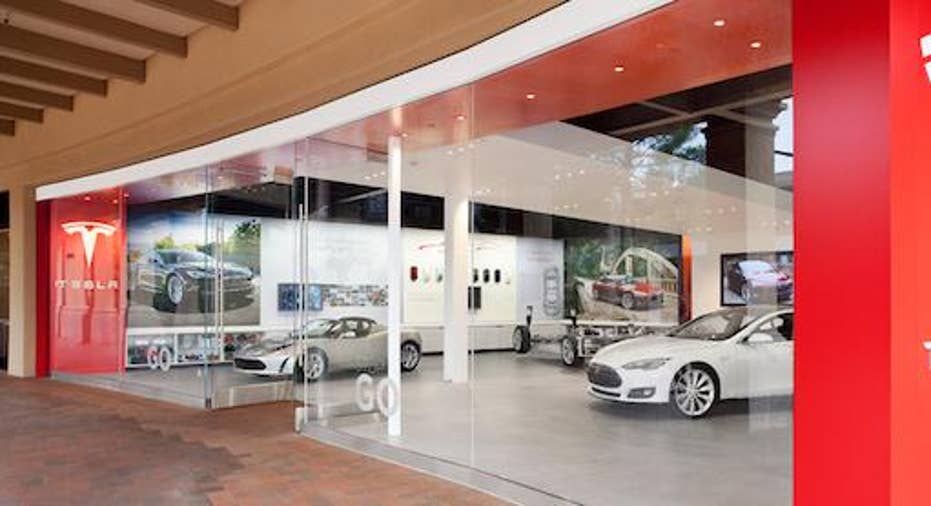Why Car Dealers Should Be Terrified of Tesla's Model 3 Numbers

Tesla showroom. Image source: Tesla.
I think that it's fair to say that essentially no one enjoys the current car-buying experience in the U.S. Consumers simply endure it.
This is why auto dealers have long viewed Tesla Motors and its direct sales model as an existential threat, despite the fact that Tesla's U.S. market share is effectively a rounding error in the context of record U.S. vehicle sales. But Tesla has historically been relegated to the low-volume luxury market segment, so its inherently limited customer base has a hard time being all that vocal when it comes to changing protectionist state laws.
That may have all just changed.
The mainstream is ready for changeIt must have dismayed dealers when hundreds of people lined up at Tesla stores last week to put down a $1,000 deposit on a car they had never even seen before. We're talking about hundreds of thousands of reservations at this point, all voting in favor of the direct sales model. Even though the Model 3 total tally, which is likely approaching 300,000 (if not more) includes international reservations, a majority of those reservations are still probably right here in the U.S.
Right now, just 6% of U.S. car sales are build-to-order, according to Automotive News. While build-to-order is quite common in Europe (roughly half of new car sales), Americans still mostly walk into a new car dealer and pick a unit from available inventory and drive it off the lot. American automakers have tried to implement build-to-order models before, but they were largely unsuccessful, in part because it affected nearly every aspect of operations.
Model 3 is demonstrating that perhaps the American consumer is ready for a change.
Dealers' last defenseEarlier this year, the FTC hosted a panel on auto distribution. While dealers touted "intrabrand competition" as their primary defense for their role in the value chain, the argument is deeply flawed. For a consumer, removing a middleman market is better than reducing it.
That being said, there is one extremely important function that dealers do play in the value chain: outsourced inventory investment and risk. Dealers, most of which are small local businesses, invest millions of dollars in vehicle inventories that any consumer can purchase on the spot. Interestingly enough, this is also part of the basis for the current protectionist laws; the laws are meant to protect those local investments from potential direct competition from the manufacturer.
Here's where it really hurts: If Model 3 represents widespread consumer interest in build-to-order, that effectively undermines the dealers' last justifiable reason to exist. At the very least, it significantly minimizes their place in the value chain.
Inventory is evilAt the FTC panel, one of the presenters was Fiona Scott Morton, the Theodore Nierenberg Professor of Economics at the Yale University School of Management. Morton notes that a wide range of industries have been changed by e-commerce and the ability to buy things on the Internet, while auto retailing stubbornly refuses to adapt. This discrepancy is becoming "more and more obvious to an ordinary consumer," particularly since buying a car is a particularly large purchase.
Over time, the consumer willingness to endure the dealer model is diminishing, since it interferes with innovation consumers are now seeing what kinds of innovation are possible without franchised dealers. She describes some other industry benefits of the build-to-order model, speaking from the perspective of an automaker:
Inherently, inventory always carries risk. If it can't be sold, then it must be written down or impaired, which is universally painful. But since build-to-order inventory is already purchased, there is very little inventory risk for the manufacturer. The OEM doesn't need to make as many estimates as to its unit mix and which trims or options will be in demand, potentially producing a vehicle that the market doesn't want.
Some inventory is always necessary, and indeed Tesla does carry new vehicle inventory. These are mostly showroom models and service loaners. The company currently has about 260 units of inventory listed for sale in the U.S. But the vast majority of its finished goods inventory ($476.5 million as of the end of 2015) consists of vehicles in transit to customers. There's very little risk associated with that inventory.
Maybe the incumbent OEMs should try build-to-order again.
The article Why Car Dealers Should Be Terrified of Tesla's Model 3 Numbers originally appeared on Fool.com.
Evan Niu, CFA owns shares of Tesla Motors, andhas the following options: long January 2018 $180 calls on Tesla Motors. The Motley Fool owns shares of and recommends Tesla Motors. Try any of our Foolish newsletter services free for 30 days. We Fools may not all hold the same opinions, but we all believe that considering a diverse range of insights makes us better investors. The Motley Fool has a disclosure policy.
Copyright 1995 - 2016 The Motley Fool, LLC. All rights reserved. The Motley Fool has a disclosure policy.



















